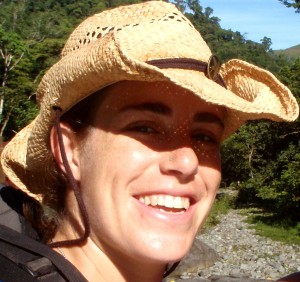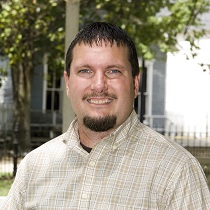 As part of our series about different types of youth work, this week we have an interview with Laura Statesir who works primarily with parents of LGBT youth at The Marin Foundation.
As part of our series about different types of youth work, this week we have an interview with Laura Statesir who works primarily with parents of LGBT youth at The Marin Foundation.
1. What type of youth work do you do?
I am the Director of Family and Youth for The Marin Foundation, a non-profit organization that works to build bridges between the lesbian, gay, bisexual and transgender (LGBT) community and the Church community.
We are based out of Chicago, Illinois but we engage with religious entities, LGBT groups, churches, NGO’s, higher educational institutions and government agencies throughout the United States, UK, Canada, Australia and New Zealand.
2. What do you do in an average week?
My time is split between conducting research, advising parents and youth, and attending/hosting events.
I am the Primary Investigator for a research study called the Parent Resource Initiative. The goal of the study is to examine Christian parents’ reactions to their child’s coming out and develop new resources to help them through that process. We are still in the research phase, so I am interviewing Christian parents and LGBT individuals and transcribing interviews.
I also speak with and give advice to Christian parents and LGBT youth. I help them navigate their questions about faith and sexuality and walk alongside them in their journey.
Finally, I participate in and help host some of The Marin Foundation events such as Living in the Tension Gatherings, the I’m Sorry Campaign, speaking engagements, and consulting with groups. For example, last week we met with a group of LGBT students from a conservative Christian college and offered guidance in negotiating the politics of their school with their desire to help educate students on their campus.
I also volunteer at an overnight homeless shelter for LGBT youth called the CRIB, through The Night Ministry.
3. How long have you been doing this type of role?
I started in this particular role about a year ago, but I have been working with youth since I was a teenager.
4. What other types of youth work have you done previously?
My background is in wilderness therapy and youth ministry. Prior to my current job I spent three and a half years in wilderness therapy and adventure education and five years in international youth ministry.
5. How old are the youth of the parents you work with?
The youth are anywhere from 11 years old to 25 years old (or whatever you decide is the cutoff age for “youth”).
6. What’s unique about your particular type of youth work?
There are few organizations that stand in the middle of the culture war between the LGBT community and Christians. Instead of trying to convince people to change their minds or win a “convert for our side”, we focus on reconciliation between these two opposed communities.
When we work with youth, we do not try to fix them and we do not tell them to forget about their faith. We walk alongside of them in solidarity and help them discover a path that fits their relationship with God.
7. What are some of the good things about working with parents of LGBT youth?
Watching reconciliation in action. Seeing hearts changed and relationships restored. Walking alongside parents as they learn to love and support their children even if they don’t understand or agree with their sexuality/gender identity. Being a light in a dark place for parents who are confused, lost, angry and hurting.
8. What are some of the challenges of it?
Whenever you seek true reconciliation and inclusion, you are always going to ruffle some feathers. Because we work with both LGBT groups and Christian groups, we receive a lot of criticism.
It breaks my heart to listen to the stories of parents and/or youth who are in pain. Sometimes I feel helpless and inept. I empathize with the people I talk to and it is difficult to not carry those emotions home with me at the end of the day.
It can also be difficult to explain what I do for a living and to find enough funding for our work.
9. Why are you passionate about working with parents of LGBT youth?
I am gay and very blessed to have wonderful loving parents, but this is not the experience of all LGBT youth. Many LGBT youth, especially those with Christian parents, are not accepted by their families. They may be rejected, kicked out of their house, and/or financially cut off. The number of homeless LGBT youth and suicides of LGBT youth in the United States is disturbing. This needs to change and one of the best ways to do so is to work directly with parents.
Also, my heart aches for Christian parents who are trying to reconcile their faith and their child’s sexuality/gender identity. These parents often face shame, stigma, and judgment from their faith communities. They feel very alone and have few resources. They often feel like they will be forced to choose between their kids and their faith. This is wrong and needs to change as well.
10. What would you recommend for someone wanting to get into this type of work?
I would recommend immersing yourself in both communities: the LGBT community, specifically with LGBT youth and gay Christians as well as the conservative Christian community, specifically with parents. Volunteer at a homeless shelter for LGBT youth. Attend existing support groups (GSA, PFLAG, support groups for Christian parents, etc.).
Read about and get to know other support groups and their philosophies. Read as many resources as you can about the intersection of faith and sexuality, youth ministry, and counseling parents. Meet with professionals who are already engaged in this work.
11. Is there any special training or qualifications required?
No specific training or qualifications are required. However, I would recommend interning or training with an organization that is currently doing this type of work.
I would also recommend attending a higher educational institution or seminary with a focus in counseling, psychology, and/or youth ministry.
12. Is there anything else you’d like to share?
The polarized culture war between the LGBT community and conservatives is not going away anytime soon. Understanding how to build bridges between these two groups is the key to peaceful reconciliation and understanding in the future.
About Laura:
Laura Statesir is the Director of Family and Youth at The Marin Foundation. She graduated from Texas A&M University in 2002. Prior to joining The Marin Foundation, Laura has worked in various types of youth organizations including Diakon Youth Services, Young Life, and Costa Rica Outward Bound. She lived in Latin America for over seven years. You can connect with her via email: Laura@themarinfoundation.org
Please feel free to use the comments below if you have any questions about working with LGBT youth or their parents. If you also work with LGBT youth or their parents, we’d love to hear about your experiences in the comments too.
If you work in a different youth work field (or country), we’d love to interview you for this series, so please get in touch!
You can also connect with us by:
- Signing up to receive our posts via email
- Following us on Twitter
- Liking us on Facebook
- Signing up to our RSS feed

 As part of our series about different
As part of our series about different  As part of our series about different
As part of our series about different  For this week’s installment in our series on
For this week’s installment in our series on